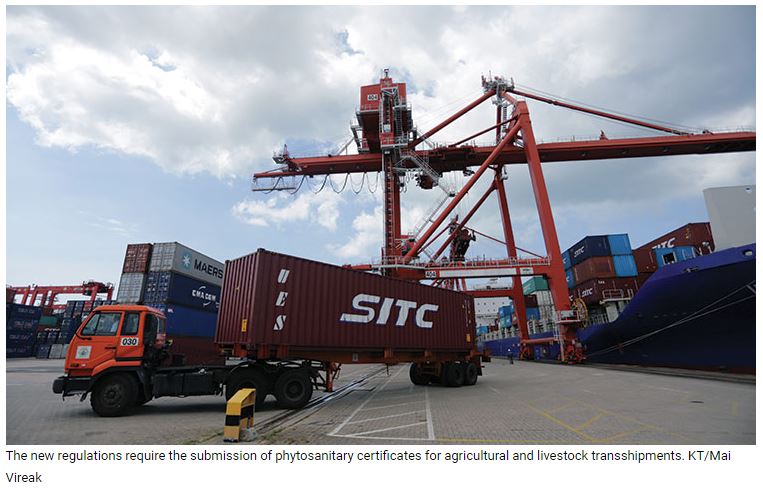Vietnam’s new customs regulations rattle exporters
Local exporters have voiced concern over new customs regulations in Vietnam that require the submission of phytosanitary certificates for agricultural and livestock transshipments, arguing that they represent a significant barrier to trade.
According to a circular issued by the Vietnamese Ministry of Agriculture and Rural Development, agricultural goods and livestock being shipped to a third country through Vietnam must be placed under quarantine.
As per the regulation, exporters are also required to present phytosanitary certifications at the loading port (Phnom Penh) as well as the Vietnamese port through which the shipment will be conducted.
The regulation was issued in June 2015, but became effective in October this year. According to Cambodian exporters, Vietnamese customs authorities started applying the regulation to shipments along the Phnom Penh-Ho Chi Minh city route last week.
“The main documents that must be submitted are the phytosanitary certificate at the port of loading, the sales contract and the transportation contract, as well as the invoice and the packing list,” a barge operator in Ho Chi Minh city said.
Cambodian exporters say the measure amounts to a non-tariff barrier that negatively impacts local exports.
Amru Rice’s managing director, Kunthy Kann, told Khmer Times that this is the first time the document is required for transshipments.
“We do not know what is going on exactly now. They did not used to ask for this document. We are afraid now our shipments will get stuck in Vietnam.
“We call this a non-tariff barrier. It does not affect Amru Rice only, it affects the exports of the whole country,” Mr Kann said.

Sin Chanthy, president of the Cambodia Freight Forwarders Association (Camffa), echoed Mr Kann’s concerns, though he explained that exporters can still use other ports in the country – such as the deep-sea port in Sihanoukville – to circumvent the regulation.
“If traders use Preah Sihanouk’s port is fine, but if they use Phnom Penh Port or the Bavet crossing they will be affected,” he said.
Mr Kann said that the Cambodian Ministry of Agriculture must make solving this issue a priority, as the regulation hurts local exporters.
“Other countries like Singapore demand nothing for transshipments. Vietnam is the only country that does, as far as we are concerned,” he said.
Ho Sivyong, director of the export and import department, told Khmer Times he was unaware of the requirement.
“We will check on this issue and get back to you later,” he told Khmer Times, adding, however that, “We don’t think it will disturb exports too much, as it is just one more document.
“It could be a barrier to trade, but we can solve it,” he added.
Ker Monthivuth, director of the plant protection and sanitary and phytosanitary department, said he has just recently been informed of the problem and was already working with Vietnamese authorities to find a solution.
“We will negotiate. However, as per international law, the phyto-sanitary certification must be checked even in transshipments. We also check for these documents in Cambodia,” Mr Monthivuth said.
He said a similar issue caused problems with Thailand earlier this year.
Source: https://www.khmertimeskh.com/50558533/vietnams-new-customs-regulations-rattle-exporters/


 English
English




